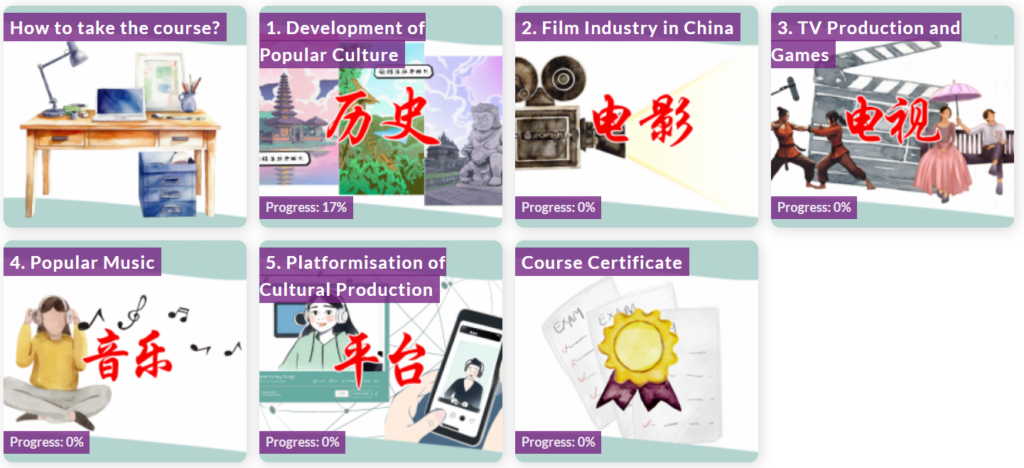WHEN? February 3, 2025 – December 18, 2026
Enroll here: https://digicampus.fi/course/view.php?id=4823

This course offers a comprehensive introduction to popular culture in contemporary China, exploring its emergence across cinema, music, television, and social media creator culture. Participants will explore how popular culture intersects with gender, class, national identity, and political power within the Chinese context. Additionally, the course will examine Chinese popular culture as a part of cultural flows within East Asia. By the end of this course, participants will be familiar with the various forms of popular culture, the factors driving its rapid evolution, and the platformisation of cultural production in China. They will also become familiar with primary sources and academic resources related to China’s popular culture, facilitating ongoing engagement and learning beyond the course.
COURSE MODULES
- Development of popular culture in China
- Film industry
- TV productions and games
- Popular music
- Platformisation of cultural production
CONTENTS
This course is divided into five thematic modules. We kick off with an introduction to the evolution of Chinese popular culture, from Shanghai’s glamorous “Golden Age” to the era of socialist cultural production, right up to today’s dynamic creator platforms. You’ll also learn key concepts and the political strategies that shape cultural production in China.
The next three modules dive into different forms of popular culture, their growth within inter-Asian dynamics, and the biggest stars and trends. First, we’ll explore the world of Chinese cinema, focusing on the influential fifth and sixth-generation filmmakers. We’ll also discuss how films serve as a tool for fostering nationalism and how nationalism, in turn, attracts audiences.
In the TV productions module, we’ll start by examining popular TV programs such as reality shows and soap operas. In addition to fan culture, we explore gender roles and representation in Chinese television. This module also explores the rapid growth of China’s digital gaming and livestreaming industries, highlighting their unique characteristics and the new opportunities they present.
In the popular music module, you’ll discover five distinct periods of Chinese music and see how these sounds continue to resonate today. We’ll also delve into inter-Asian musical influences, highlighting the impact of the K-pop industry on Chinese music, and give you a glimpse into the Chinese rock and hip-hop scenes. Our final module explores the contemporary phenomenon of platformisation. You’ll see how culture is consumed and produced on various social platforms and live gaming sites, and learn about the innovative business models they’ve spawned. We’ll also spotlight how everyday people are emerging as creators of online popular culture.
MATERIALS
The core materials consist of short (20 min) recorded lectures and slide decks that are prepared by leading experts on China. In addition, the versatile learning materials include timelines, infographics, podcasts and open access online materials. Learners will also get acquainted with central sources of information about China, including selected Chinese webpages. The learning experience is enriched by various types of automatically graded assignments.
TAKEN AS
Asynchronous learning allows students to customize their study schedules and progress independently. Each module consists of learning materials, assignments and an exam. The assignments vary in length and difficulty, and have limitless attempts. The exams consist of six randomly selected multiple-choice questions. There are three attempts for each exam. In order to complete the course and receive a course certificate, students need to pass all assignments and exams within the course period.
The course is graded pass/fail. When students have successfully completed all assignments and exams, they may produce an automatically generated course certificate of completion. The certificate can be digitally verified. The course is worth 3 ECTS credits (ca 80 hours of work). The courses are run on the DigiCampus learning platform. Students can sign up on this page https://digicampus.fi/course/index.php?categoryid=247.
For more information, please contact Dr Outi Luova at outi.luova@utu.fi, CEAS, University of Turku